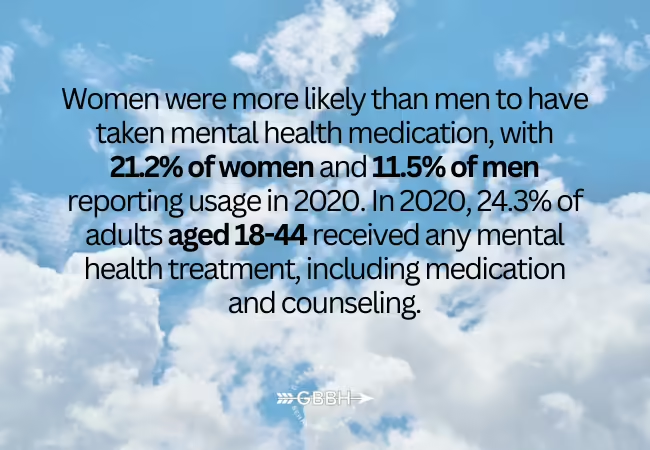Mental health challenges impact millions of individuals across the United States, but advancements in treatment offer hope for those seeking relief and recovery. One of the cornerstones of mental health care is the use of medications, often in conjunction with therapeutic approaches like CBT Therapy and DBT Therapy. At Greater Boston Behavioral Health, we integrate medication management into our comprehensive mental health treatment programs to ensure personalized, effective care for our clients.
Mental health medications play a pivotal role in managing various mental health conditions, offering relief from symptoms and improving overall quality of life. They are often prescribed as part of a comprehensive treatment plan that may also include evidence-based therapies like CBT Therapy and DBT Therapy. By addressing chemical imbalances in the brain, these medications can help individuals stabilize their emotions, reduce distress, and enhance their ability to engage in daily activities.
The Role of Medications in Mental Health Treatment
Medications play a critical role in managing symptoms of various mental health conditions. For many individuals, medications can help restore chemical imbalances in the brain, reduce the severity of symptoms, and improve overall quality of life.
Why Medications Are Used
- Symptom Management: Medications alleviate symptoms like anxiety, depression, mood instability, or psychosis, helping individuals regain stability.
- Improved Therapy Outcomes: When combined with therapies like CBT Therapy or DBT Therapy, medications can enhance treatment effectiveness.
- Support for Long-Term Recovery: For chronic conditions like bipolar disorder or schizophrenia, medications provide a foundation for ongoing stability.
Common Types of Mental Health Medications
Understanding the categories of mental health medications can demystify their role in treatment. Below are the most common types prescribed as part of mental health treatment programs:
1. Antidepressants
- Used for: Depression, anxiety disorders, PTSD.
- How they work: Antidepressants like SSRIs (e.g., Prozac, Zoloft) and SNRIs (e.g., Effexor) help regulate neurotransmitters like serotonin and norepinephrine to improve mood.
- Impact: Reduces feelings of sadness, improves sleep, and alleviates anxiety.
2. Anti-Anxiety Medications
- Used for: Generalized Anxiety Disorder (GAD), panic disorders, social anxiety.
- How they work: Medications like benzodiazepines (e.g., Xanax, Ativan) provide quick relief from acute anxiety, while other options like Buspirone offer long-term benefits.
- Impact: Promotes calmness and reduces physical symptoms of anxiety.
3. Mood Stabilizers
- Used for: Bipolar disorder, mood swings.
- How they work: Medications like Lithium and anticonvulsants (e.g., Lamictal) help regulate mood fluctuations.
- Impact: Prevents extreme highs (mania) and lows (depression), fostering emotional balance.
4. Antipsychotics
- Used for: Schizophrenia, bipolar disorder, severe depression.
- How they work: Antipsychotics (e.g., Abilify, Risperdal) regulate dopamine and serotonin to address psychosis or mood instability.
- Impact: Reduces hallucinations, delusions, and severe agitation.
5. Stimulants
- Used for: Attention-Deficit/Hyperactivity Disorder (ADHD).
- How they work: Stimulants like Adderall and Ritalin increase dopamine and norepinephrine to improve focus and impulse control.
- Impact: Enhances attention span, reduces hyperactivity, and improves productivity.
How Medications Work
Mental health medications target chemical imbalances in the brain that contribute to emotional and psychological distress. They primarily work by influencing neurotransmitters—chemical messengers in the brain responsible for mood regulation, focus, and stress responses.
1. Regulating Neurotransmitters
Most mental health medications affect neurotransmitters like serotonin, dopamine, and norepinephrine:
- Antidepressants: Increase serotonin and norepinephrine levels to alleviate depression and anxiety.
- Antipsychotics: Adjust dopamine activity to reduce symptoms of psychosis or severe mood disorders.
- Stimulants: Boost dopamine and norepinephrine levels to improve focus and impulse control in ADHD.
2. Rebalancing Brain Chemistry
For individuals with conditions like bipolar disorder, mood stabilizers help maintain a consistent mood by preventing extreme highs (mania) and lows (depression). Similarly, anti-anxiety medications calm overactive brain responses to reduce physical and emotional symptoms of anxiety.
3. Supporting Therapy Effectiveness
By reducing the severity of symptoms, medications can make it easier for individuals to engage in therapeutic practices like CBT Therapy and DBT Therapy, leading to more effective and lasting results.
Common Concerns About Medications
Despite their benefits, many people have reservations about starting mental health medications. Addressing these concerns is essential to ensure individuals feel confident and informed about their treatment.
1. Fear of Side Effects
One of the most common concerns is the potential for side effects, which can range from mild (e.g., nausea, headaches) to more significant issues like drowsiness or weight changes. It’s important to note that:
- Side effects often diminish as the body adjusts to the medication.
- Regular check-ins with your healthcare provider allow for adjustments to minimize discomfort.
2. Stigma Around Mental Health Medications
Many individuals worry about being judged for taking medications, associating it with weakness or failure. At Greater Boston Behavioral Health, we emphasize that seeking help and using medications is a sign of strength and self-care. Medications are tools that support recovery, just as treatments for physical illnesses do.
3. Dependency Concerns
Some people fear becoming reliant on medications. While certain medications, like benzodiazepines, require careful monitoring to prevent dependency, most mental health medications are designed for long-term use without the risk of addiction. Your provider will work with you to create a treatment plan that aligns with your needs and goals.
4. Uncertainty About Effectiveness
Medications don’t work the same way for everyone, and it can take time to find the right type and dosage. This process may feel discouraging, but it’s a normal part of treatment. With proper monitoring and communication, most individuals find a medication that significantly improves their symptoms.
5. Cost and Accessibility
The affordability and availability of medications can be a concern. Many providers, including Greater Boston Behavioral Health, offer resources to help clients navigate insurance coverage and access cost-effective options.
Integrating Medications with Therapy
While medications are essential for managing symptoms, they work best when combined with evidence-based therapies. At our Mental Health Treatment Center in Boston, we use an integrative approach:
- CBT Therapy (Cognitive Behavioral Therapy): Helps clients identify and change negative thought patterns and behaviors. When paired with medications, CBT addresses the root causes of mental health challenges, leading to long-lasting recovery.
- DBT Therapy (Dialectical Behavior Therapy): Focuses on emotional regulation, distress tolerance, and interpersonal effectiveness. DBT is particularly effective for individuals with mood disorders, providing skills to navigate challenges alongside medication support.
The Importance of Medication Management
Effective use of mental health medications requires careful planning and monitoring. Our Mental Health Therapy Programs include medication management services to ensure safety and efficacy. Key aspects of medication management include:
- Personalized Prescriptions: Each client receives medications tailored to their unique needs and diagnosis.
- Monitoring and Adjustments: Regular evaluations ensure the right dosage and address any side effects.
- Education and Support: Clients are educated on how medications work, potential side effects, and the importance of adherence.
Medication management is a collaborative effort between clients, therapists, and psychiatrists, fostering a holistic approach to care.
Overcoming Stigma Around Mental Health Medications
Despite their benefits, many people hesitate to use mental health medications due to stigma or misconceptions. At Greater Boston Behavioral Health, we work to break down these barriers by providing education and compassionate support. It’s important to remember:
- Medications are tools, not crutches, in mental health recovery.
- Seeking help and using medications demonstrates strength, not weakness.
- Combining medications with therapies like CBT Therapy or DBT Therapy enhances the journey toward well-being.
Conclusion
Mental health medications are a powerful component of recovery, especially when integrated with therapies and a supportive care environment. At Greater Boston Behavioral Health, we are committed to providing a well-rounded approach to treatment, ensuring every client receives the care they need to thrive.
If you or a loved one is seeking help, reach out to our Mental Health Treatment Center in Boston today. Our team of experienced professionals will guide you through personalized treatment plans, combining medication management and therapy for optimal results.
FAQ on Mental Health Medications
What are mental health medications?
Mental health medications are prescription drugs that help manage symptoms of mental health conditions by balancing brain chemicals. They are often used in conjunction with therapies like CBT Therapy and DBT Therapy.
How do mental health medications work?
These medications influence neurotransmitters like serotonin, dopamine, and norepinephrine to regulate mood, reduce anxiety, and manage symptoms of various conditions such as depression and bipolar disorder.
Are mental health medications addictive?
Most mental health medications, such as antidepressants and mood stabilizers, are not addictive. However, some anti-anxiety medications like benzodiazepines require careful monitoring to prevent dependency.
How long do mental health medications take to work?
The time varies depending on the medication and individual. Many medications, such as antidepressants, may take 4-6 weeks to show significant effects, while others, like anti-anxiety medications, can work more quickly.
What are common side effects of mental health medications?
Side effects vary by medication and individual but may include nausea, drowsiness, weight changes, or dry mouth. These often lessen over time, and your healthcare provider can adjust your treatment if needed.


